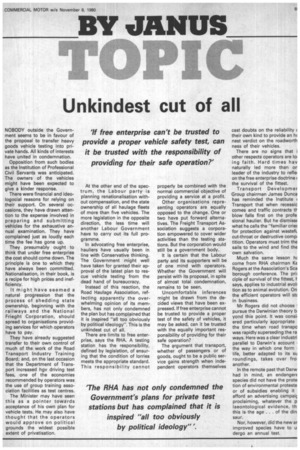BY JANUS
Page 71

If you've noticed an error in this article please click here to report it so we can fix it.
Unkindest cut of all
NOBODY outside the Government seems to be in favour of the proposal to transfer heavy goods vehicle testing into private hands. All kinds of interests have united in condemnation.
Opposition from such bodies as the Institution of Professional Civil Servants was anticipated. The owners of the vehicles might have been expected to give a kinder response.
There were financial and ideologocial reasons for relying on their support. On several occasions, they have drawn attention to the expense involved in preparing and submitting vehicles for the exhaustive annual examination. They have complained just as loudly each time the fee has gone up.
They presumably ought to think that under free enterprise the cost should come down. The principle is one to which they have always been committed. Nationalisation, in their book, is a recipe for high prices and inefficiency.
It might have seemed a natural progression that the process of shedding state ownership, beginning with the railways and the National Frieght Corporation, should spread to organisations providing services for which operators have to pay.
They have already suggested transfer to their own control of much of the work of the Road Transport Industry Training Board; and, on the last occasion that the Department of Transport increased hgv driving test fees, one of the economies recommended by operators was the use of group training association facilities as test centres.
The Minister may have seen this as a pointer towards acceptance of his own plan for vehicle tests. He may also have thought that the operators would approve on political grounds the widest possible extent of privatisation. At the other end of the spectrum, the Labour party is planning renationalisation without compensation, and the state ownership of all haulage fleets of more than five vehicles. The more legislation in the opposite direction, the less time will another Labour Government have to carry out its full programme.
In advocating free enterprise, hauliers have usually been in line with Conservative thinking. The Government might well have taken for granted their approval of the latest plan to rescue vehicle testing from the dead hand of bureaucracy.
Instead of this reaction, the Road Haulage Association, reflecting apparently the overwhelming opinion of its members, has not only condemned the plan but has complained that it is inspired "all too obviously by political ideology". This is the unkindest cut of all.
There are limits to free enterprise, says the RHA. A testing station has the responsibility, defined by legislation, of ensuring that the condition of lorries meets the appropriate standard. This responsibility cannot properly be combined with the normal commercial objective of providing a service at a profit.
Other organisations representing operators are equally opposed to the change. One or two have put forward alternatives. The Freight Transport Association suggests a corporation empowered to cover wider activities than the testing stations. But the corporation would still be a government body.
It is certain that the Labour party and its supporters will be of one mind with operators. Whether the Government will persist with its proposal, in spite of almost total condemnation, remains to be seen.
Uncomfortable inferences might be drawn from the decided views that have been expressed. If free enterprise cannot be trusted to provide a proper test of the safety of vehicles, it may be asked, can it be trusted with the equally important responsibility of providing for their safe operation?
The argument that transport, whether of passengers or of goods, ought to be a public service gains strength when independent operators themselves cast doubts on the reliability ( their own kind to provide an hc nest verdict on the roadworth ness of their vehicles.
There are no signs that i other respects operators are lo: ing faith. Hard times hay naturally led more than or leader of the industry to refle, on the free enterprise doctrine ( the survival of the fittest.
Transport Developmer Group chairman James Dunce has reminded the Institute ( Transport that when recessic comes and traffic contracts th blow falls first on the profe sional haulier. But he dismisss what he calls the "familiar cries for protection against wastefL cut-throat or destructive comp, tition. Operators must trim the sails to the wind and find the own salvation.
Much the same lesson hs come from RHA chairman KE Rogers at the Association's Sca borough conference. The pril ciple of survival of the fittest, t says, applies to industrial evoli tion as to animal evolution. On the efficient operators will sts in business.
Mr Rogers did not choose pursue the Darwinian theory b yond this point. It was consi, ered particularly appropriate the time when road transpo was rapidly superseding the ra ways. Here was a clear industri parallel to Darwin's account the way in which one form life, better adapted to its su roundings, takes over fro another.
In the remote past that Darw had in mind, an endangers species did not have the prole tion of environmental proteste or of subsidies enabling it afford an advertising campaic proclaiming, whatever the p laeontological evidence, th this is the age . . . of the din saur.
Nor, however, did the new ar improved species have to u dergo an annual test.




















































































































